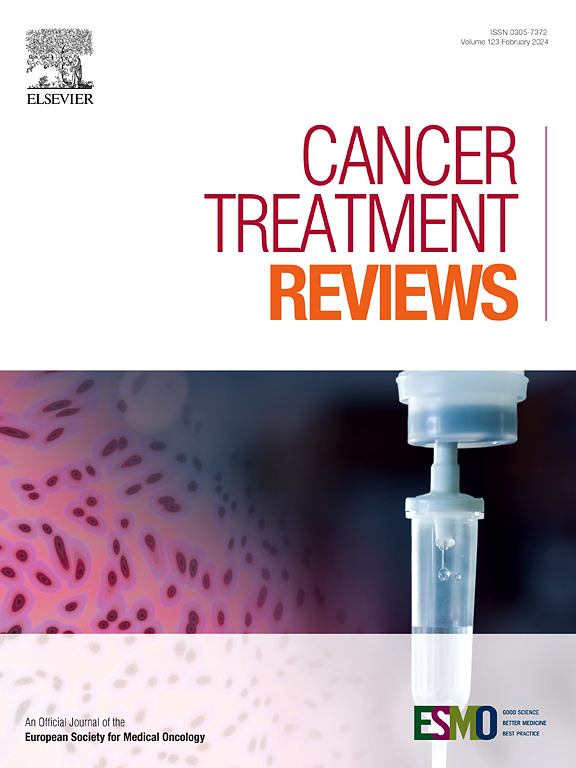黑色素瘤相关抗原 A4:作为采用 T 细胞受体 T 细胞疗法靶点的癌症/睾丸抗原
IF 9.6
1区 医学
Q1 ONCOLOGY
引用次数: 0
摘要
t细胞受体(TCR) t细胞疗法是一种过继细胞疗法,通过改造患者细胞,使其表达针对特定癌症抗原的TCR,并将其注入患者体内。由于TCR识别依赖于人类白细胞抗原系统的抗原呈递,因此TCR可以对细胞内抗原作出反应。癌/睾丸抗原(cta)是一个大的蛋白质家族,其中许多仅在癌组织和免疫特权生殖系部位表达。黑色素瘤相关抗原A4 (MAGE-A4)是一种细胞内CTA,在健康睾丸和胎盘以及一系列癌症中表达,包括食管癌、头颈癌、胃癌、卵巢癌、结肠直肠癌、肺癌、子宫内膜癌、宫颈癌、膀胱癌、乳腺癌和前列腺癌;软组织肉瘤;尿路上皮癌和肝细胞癌;骨肉瘤;和黑素瘤。这种表达模式,加上MAGE-A4的免疫原性和在肿瘤发生中的潜在作用,使其成为TCR t细胞治疗的主要靶点。我们概述了靶向cta治疗实体瘤的TCR t细胞疗法的临床前和临床发展,强调了对假定的脱靶效应和潜在的靶向但非肿瘤效应进行广泛临床前表征的必要性。我们确定了10个临床试验,评估针对MAGE-A4的TCR t细胞疗法。总体而言,已经观察到可管理的安全性和有效性信号,特别是在晚期滑膜肉瘤、黏液样/圆细胞脂肪肉瘤、卵巢癌、头颈部和尿路上皮癌患者中,美国食品和药物管理局于2024年8月批准了一种TCR t细胞疗法。我们还回顾了这些疗法的局限性,以及提高疗效和提高安全性的策略,并总结了针对MAGE-A4的相关免疫疗法。本文章由计算机程序翻译,如有差异,请以英文原文为准。

Melanoma-associated antigen A4: A cancer/testis antigen as a target for adoptive T-cell receptor T-cell therapy
T-cell receptor (TCR) T-cell therapies are adoptive cell therapies in which patient cells are engineered to express TCRs targeting specific cancer antigens and infused back into the patient. Since TCR recognition depends on antigen presentation by the human leukocyte antigen system, TCRs can respond to intracellular antigens. Cancer/testis antigens (CTAs) are a large family of proteins, many of which are only expressed in cancerous tissue and immune-privileged germline sites. Melanoma-associated antigen A4 (MAGE-A4) is an intracellular CTA expressed in healthy testis and placenta, and in a range of cancers, including esophageal, head and neck, gastric, ovarian, colorectal, lung, endometrial, cervical, bladder, breast and prostate cancers; soft tissue sarcomas; urothelial and hepatocellular carcinomas; osteosarcoma; and melanoma. This expression pattern, along with the immunogenicity and potential role in tumorigenesis of MAGE-A4 make it a prime target for TCR T-cell therapy. We outline the preclinical and clinical development of TCR T-cell therapies targeting CTAs for treatment of solid tumors, highlighting the need for extensive preclinical characterization of putative off-target, and potential on-target but off-tumor, effects. We identified ten clinical trials assessing TCR T-cell therapies targeting MAGE-A4. Overall, manageable safety profiles and signals of efficacy have been observed, especially in patients with advanced synovial sarcoma, myxoid/round cell liposarcoma, ovarian, head and neck, and urothelial cancers, with one TCR T-cell therapy approved by the US Food and Drug Administration in August 2024. We also review the limitations, and strategies to enhance efficacy and improve safety, of these therapies, and summarize related immunotherapies targeting MAGE-A4.
求助全文
通过发布文献求助,成功后即可免费获取论文全文。
去求助
来源期刊

Cancer treatment reviews
医学-肿瘤学
CiteScore
21.40
自引率
0.80%
发文量
109
审稿时长
13 days
期刊介绍:
Cancer Treatment Reviews
Journal Overview:
International journal focused on developments in cancer treatment research
Publishes state-of-the-art, authoritative reviews to keep clinicians and researchers informed
Regular Sections in Each Issue:
Comments on Controversy
Tumor Reviews
Anti-tumor Treatments
New Drugs
Complications of Treatment
General and Supportive Care
Laboratory/Clinic Interface
Submission and Editorial System:
Online submission and editorial system for Cancer Treatment Reviews
 求助内容:
求助内容: 应助结果提醒方式:
应助结果提醒方式:


